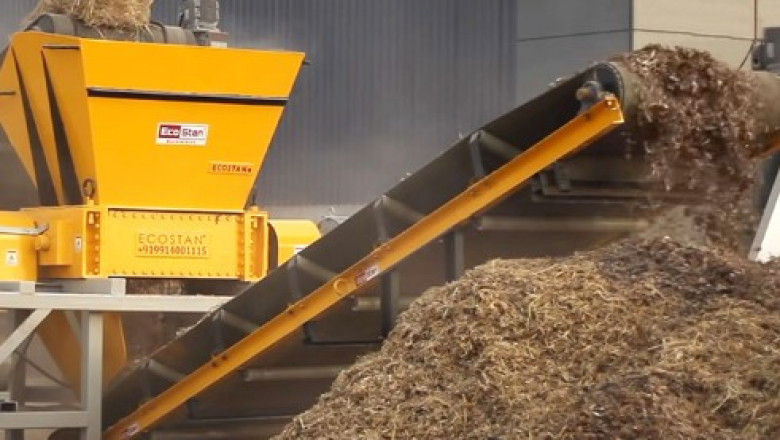views
Top 7 Advantages of Using a Biomass Pellet Machine for Sustainable Fuel
As the world increasingly turns toward renewable energy, the role of biomass has become more prominent than ever. Biomass energy offers a cleaner, greener alternative to fossil fuels, and at the heart of this transformation lies a key technology: the biomass pellet machine. This powerful equipment is revolutionizing how industries and rural communities convert agricultural and forestry waste into a sustainable fuel source.
In this blog, we’ll explore the top 7 advantages of using a biomass pellet machine for sustainable fuel production—helping you understand why it’s a smart investment for both economic and environmental reasons.
1. Efficient Conversion of Agricultural Waste into Fuel
One of the most significant advantages of a biomass pellet machine is its ability to convert various types of agricultural and forestry waste into high-energy fuel pellets. Materials such as sawdust, rice husks, sugarcane bagasse, wheat straw, and corn stalks can be processed easily.
Instead of letting this biomass go to waste or burning it in open fields (which causes pollution), pellet machines compress the raw material into dense, uniform pellets that are easy to handle, store, and transport. This turns low-value residue into a high-value renewable energy source, promoting circular waste management.
2. Cost-Effective and Economical Energy Solution
Energy production can be expensive—especially when relying on fossil fuels like coal, oil, or natural gas. Biomass pellets, produced using a biomass pellet machine, offer a cost-effective alternative.
The raw materials used in pellet production are often byproducts or waste materials, meaning they are readily available at little or no cost. Once converted into pellets, they provide a consistent and reliable fuel source at a fraction of the cost of conventional energy sources. For industries and businesses looking to cut fuel expenses, switching to biomass pellets makes both environmental and economic sense.
3. Reduces Greenhouse Gas Emissions
Biomass is a carbon-neutral energy source. Unlike fossil fuels, which release carbon stored for millions of years, biomass fuels release only as much CO₂ as the plants absorbed during their growth. When used correctly, the biomass pellet machine helps reduce the carbon footprint significantly.
Additionally, pellets burn more cleanly than raw biomass due to their low moisture content (generally below 10%). This efficient combustion reduces harmful emissions such as carbon monoxide, sulfur dioxide, and particulate matter—making it a cleaner option for both residential heating and industrial energy generation.
4. Improved Energy Efficiency and High Calorific Value
Another key benefit of using a biomass pellet machine is that the resulting pellets have a higher energy density than raw biomass. Because the material is compressed, biomass pellets boast a high calorific value, typically around 4000–4500 kcal/kg. This makes them highly efficient and suitable for a wide range of heating applications.
Whether you’re running a biomass boiler, a pellet stove, or an industrial furnace, using pellets ensures more heat output per unit of fuel. This high energy yield translates to improved performance and lower operational costs for energy systems.
5. Ease of Storage, Transportation, and Handling
Raw biomass materials like straw, husk, or sawdust are bulky, inconsistent in shape, and difficult to store or transport. However, once processed by a biomass pellet machine, these materials are turned into compact, cylindrical pellets with uniform size and density.
Pellets are easy to bag, store, and transport, which reduces logistics costs and improves supply chain efficiency. This convenience is especially valuable for large-scale biomass projects and rural energy systems, where infrastructure might be limited. Pellets can also be stored for long periods without significant degradation.
6. Supports Rural Development and Local Economies
Biomass pellet production can stimulate local economies by creating jobs in rural areas. Many of the raw materials used in pellet production are sourced directly from farms, forests, or agro-industrial operations. By establishing small- to medium-scale biomass pellet machine setups locally, communities can generate employment in collection, processing, operation, and maintenance.
Moreover, decentralized energy production using biomass pellets empowers rural areas to become energy self-sufficient, reducing reliance on imported fuels and central power grids. This helps bridge the urban-rural energy gap while promoting local entrepreneurship.
7. Versatile Applications Across Sectors
One of the most attractive aspects of biomass pellets is their versatility. With the help of a biomass pellet machine, you can produce pellets that serve various applications:
-
Residential heating: Pellet stoves and boilers provide efficient and clean home heating.
-
Industrial use: Factories can use pellets as an alternative to coal for steam generation and heat processes.
-
Power generation: Biomass power plants can use pellets to generate electricity on a large scale.
-
Animal bedding and composting: Certain types of biomass pellets can also be used in agriculture and livestock farming.
This wide range of applications ensures that investing in a biomass pellet machine is a future-proof decision, whether for personal, commercial, or industrial purposes.
Bonus: Long-Term Environmental and Regulatory Benefits
Governments across the globe are tightening environmental regulations and encouraging the adoption of renewable energy. Countries offer subsidies, carbon credits, and tax benefits to individuals and companies adopting clean technologies like biomass pellet production.
By integrating a biomass pellet machine into your operations, you not only contribute to global sustainability goals but also position your business to benefit from green incentives. In a carbon-conscious economy, such an approach enhances brand image and ensures compliance with current and future energy policies.
Conclusion
The biomass pellet machine is more than just a piece of equipment—it’s a gateway to sustainable energy, waste reduction, and economic empowerment. From improving energy efficiency to cutting carbon emissions and supporting rural livelihoods, the benefits of biomass pelletization are too significant to ignore.
Whether you’re an individual looking to switch to renewable heating solutions or a business exploring eco-friendly energy alternatives, a biomass pellet machine offers a practical, scalable, and profitable way forward. As the global shift toward clean energy accelerates, adopting biomass technology is not just a smart move—it’s a necessary one.














Comments
0 comment